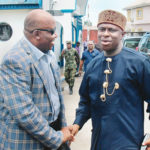These quoted words of President Roosevelt were his direct responses to the large scale destruction of books and other intellectual materials by Germany during the Second World War. With Adolf Hitler’s blessings, books were drawn from universities and homes, piled up to be burnt. It all started in Berlin and the exercise of burning books was held across the country. In their own thinking, and intoxicated with a delusionary nationalism, Germansburnt the books to expurgate un-German materials from Germany’s system and thoughts. At the end, about 100 million books from 957 libraries and 531 institutes, amongst others, were destroyed. It was therefore a great seminal event when the ISGPP Book Readers Club was formally launched on 8 August, 2018. The launch event witnessed a deep intellectual excursion into the trajectories of learning, documented ideas, the defining thoughts and their nuanced richness as served by the Chairman, Booksellers Limited, Dr. KoladeMosuro, who was keynote speaker. As I am convinced that the reading public would benefit from the deep and rich ideas that Dr. Mosuro shared, I had plans to share some of his thoughts much more generously in my subsequent write up.
The Ibadan School of Government and Public Policy (ISGPP) recognises the strategic importance of intellectual materials including books in the generation of new modes of expressions and experiences, to explore, represent or reform the society and human experiences. Beyond these, ISGPP is also interested in interrogating books as policies, thoughts and documented ideas.
Unraveling researched ideas that could enrich development thinking is therefore the motive behind the establishment of the ISGPP Book Readers Club, entrusted with the mandate of not just promoting the culture of reading books. The Club provides a vibrant platform for the interrogation of documented ideas, frameworks and paradigms thus engendering critical interactions and discourse among crucial members of the Nigerian public, on various issues that have serious bearing on the Nigerian condition At the event, book aficionados agreed that lifelong education suggests that beyond the structured formal years of education, the process of learning continues in different forms. Globally, lifelong education has been identified as the most important driver of social, economic, political, technological, and environmental development. However, meaningful and realistic national development can only be achieved when sufficient attention is paid to strengthening the implementation of lifelong education. Therefore, it becomes imperative that governments and the private sectors make substantial sacrifices, in terms of resources, time, energy, and expertise towards the promotion of sustainable lifelong education in Nigeria. It is by this process that developing countries like Nigeria can derive the fullest benefit from lifelong education and achieve the desired development objective of improving the quality of life of its citizens.
The rate of access to the information resources and the extensive reading rate per capita are the development indices of a society; that is why the current world is called the information or the network society. The main feature of the network society is the elimination of spatial and temporal distances and information accessibility and utilizing them. However, despite the increasing extension of mass media, technology and internet, the matter of studying and book reading is still crucial.
- Olaopa is Professor of Public Administration at Lead City University, Ibadan, Oyo State.






